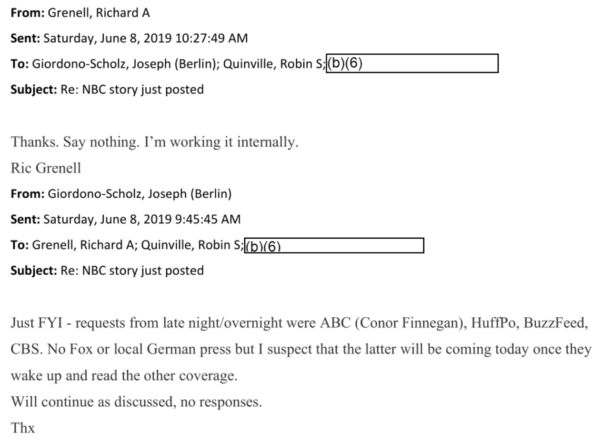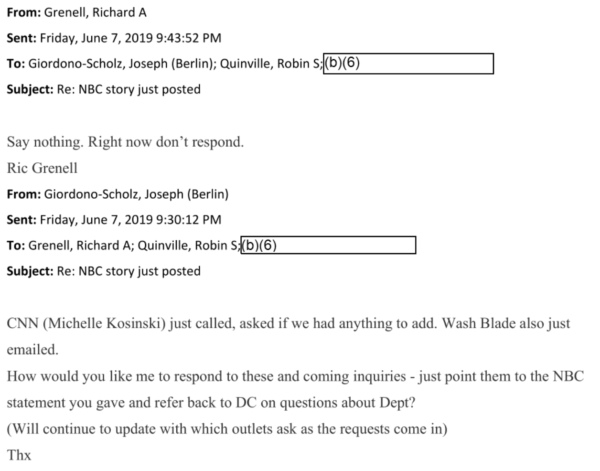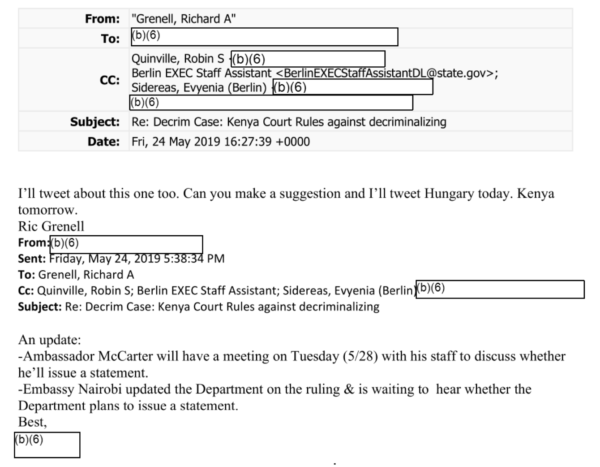The latest emails from the State Department obtained by the Washington Blade via its lawsuit under the Freedom of Information Act reveal internal deliberation in the Trump administration over news reports about the prohibition of displaying Pride flags on the official pole at U.S. embassies.
Former U.S. Ambassador Richard Grenell, whose emails the Blade is seeking as the public face of a global initiative that pledged to decriminalize homosexuality, is repeatedly shown in the communications instructing his aides at the embassy in Berlin to give no comment to the media, including in response to an inquiry at the time from the Blade, on the flag policy for embassies.
“Thanks. Say nothing. I’m working it internally,” Grenell responds in an email chain after being updated on the latest media inquiries, which included requests from ABC’s Conor Finnegan, the Huffington Post, Buzzfeed, and CBS.

It’s unclear what, if anything, Grenell was doing as part of “working it internally” as news broke that embassies were barred from flying Pride flags on the official pole, or even whether he was seeking a substantive change as opposed to crafting talking points to mitigate the appearance of the Trump administration being anti-LGBTQ.
“No Fox or local German press but I suspect that the latter will be coming today once they wake up and read other coverage,” writes Joseph Giordono-Scholz, who was handling media relations for the embassy. “Will continue as discussed, no responses.”
In 2019, shortly after Grenell announced he’d spearhead a global initiative to decriminalize homosexuality on behalf of the Trump administration, U.S. embassies that had sought to raise the rainbow flag in recognition of June as Pride month were barred from doing so under guidance from the State Department.
Critics at the time jumped on the policy as further evidence the Trump administration was anti-LGBTQ, despite having recently launched the decriminalization initiative. Trump defenders pointed out the prohibition was limited to the official pole, was a general ban of flying any flag other than the U.S. flag, and embassies found other ways to display the Pride flag on their grounds.
Grenell didn’t respond Tuesday to the Blade’s request for comment on the meaning of “working it internally,” but Log Cabin Republicans, an organization close to Grenell, volunteered a message shortly after the Blade sent its inquiry to him.
Charles Moran, managing director of Log Cabin Republicans, said in the email the conception the Trump administration banned Pride flags at embassies is erroneous.
“We were very pleased that President Trump made it clear that pride flags could continue to be flown at embassies around the globe, despite logistical discussions internally being had at the State Department,” Moran said.
Attached in the email is an image of Moran standing below a pole with both a U.S. flag and a rainbow flag, which Moran said was taken at the U.S. Embassy Berlin on July 26, 2019, when he was en route to a decriminalization discussion forum being hosted there.
Asked by the Blade whether that was the official pole, Moran replied, “I don’t know what an ‘official pole’ is. It was a professionally installed flag pole, on the embassy next to the front door.” Moran didn’t respond to an additional follow up question on what he meant by Trump making it clear Pride flags would be allowed at embassies.
Morgan Ortagus, then-spokesperson for the State Department, defended former Secretary of State Mike Pompeo’s policy against Pride flags on as she acknowledged “Pride Month that we’re in right now celebrated around the world by many State Department employees, by many embassies.”
“The secretary has the position that, as it related to the flag pole, that only the American flag should be flown there,” Ortagus said.
The email chain within the U.S. embassy in Berlin on the news development began with Giordono-Scholz forwarding Grenell a link to a story from NBC News’s Josh Lederman, who broke the story on U.S. embassies being unable to fly Pride flags, followed by a subsequent email with the text of his article. The immediacy with which the aide sends the link in an email first before the story itself in a subsequent message suggests a sense of urgency in distribution and awareness the article would be forthcoming.
Other news outlets were quick to follow up, including the Blade, as evidenced by Giordono-Scholz’s follow up question to Grenell after sharing the initial NBC News story.
“CNN (Michelle Kosinski) just called, asked if we had anything to add,” Giordono-Scholz writes. “Wash Blade also just emailed. How would like me to respond to these and coming inquiries — just point them to the NBC statement you gave and refer back to DC on questions about the Dept?”
Grenell was succinct in response: “Say nothing. Right now don’t respond.”

Giordono-Scholz acknowledges the instructions from Grenell in a subsequent email, which also notifies him of an inquiry from the Washington Post’s Carol Morello.
“Will continue to let you know about inquires but not respond to any,” Giordono-Scholz writes.
The emails were obtained in a FOIA production from the State Department this week as a result of a lawsuit filed by the Blade with attorneys at the law firm Davis Wright Tremaine LLP. The litigation was filed in August 2021 after interminable delays in production of communications, which the Blade initially sought by a FOIA request in September 2020.
The State Department has identified tens of thousands of emails potentially responsive to the Blade’s request and is expected to release those it deems to be responsive periodically as a result of an agreement in the litigation.
Also ensnared in the latest email dump are communications on other foreign policy topics, including the Nord Strom 2 pipeline and Iran’s seizure of oil tankers. Many of these emails reveal a preoccupation with using tweets as a tool to convey foreign policy messages with little else mentioned in terms of engagement.
“I’m watching. Already tweeted about it ;)” Grenell responds when an aide informs him that Iran has seized oil tankers.
Evyenia Sidereas, political minister-counselor at the U.S. embassy in Berlin, responds: “My twitter alerts can’t keep up :),” which prompts Grenell to reply: “I’ve been a little busy today. Lol.”
The emphasis on Twitter is also seen after an aide in May 2019 brings to Grenell’s attention the Kenya high court has affirmed the country’s law against homosexuality. An aide (whose name the State Department redacted in the email) informs him then-U.S. Ambassador Kyle McCarter is set to have a meeting with staff “to discuss whether he’ll issue a statement” and the embassy in Nairobi had updated the State Department while awaiting further guidance.
“I’ll tweet about this one, too,” Grenell says. “Can you make a suggestion and I’ll tweet Hungary today. Kenya tomorrow.” (It’s unclear what the reference to Hungary was regarding.)

In terms of discussion at the U.S. embassy on the Kenya decision, whatever was considered apparently didn’t bear fruit. The Blade couldn’t immediately find any public statement on the Kenya decision from McCarter in his capacity as a U.S. ambassador during the Trump administration. McCarter didn’t respond to the Blade’s request to comment for this article.
In 2018, McCarter was grilled during his Senate confirmation hearing on his record as an Illinois state legislator who opposed LGBTQ rights, including his vote against an anti-bullying measure after stating he believed it would promote homosexuality. McCarter also had a history of misogynistic tweets and in 2016 tweeted: “Hillary for Prison. No, really.”
Much of the focus on the Trump administration’s global initiative appeared to be Iran, which has been an antagonist on the global stage and more so after Trump withdrew from the Iran deal. Iran is also one of the countries where homosexuality is not only criminalized, but punishable by death.
Although Grenell has publicly disputed Iran was the focus, he was quick to provide a quote to his assistant seeking a response from him after the country’s foreign minister affirmed its anti-gay policy in response to questions from a reporter with a German newspaper.
“The UN’s Declaration of Human Rights makes clear that these answers from the Iranian regime are violating basic UN principles,” Grenell writes. “UN members should agree with the Declaration in order to be members. Criminalizing homosexuality violates the Declaration, plain and simple.”
Grenell’s response was later found online in an article in The Jerusalem Post, which covered reaction to the news in an article titled, “Iran’s FM affirms right to execute gays and blasts U.S. and Israel.”
Story courtesy of the Washington Blade.

